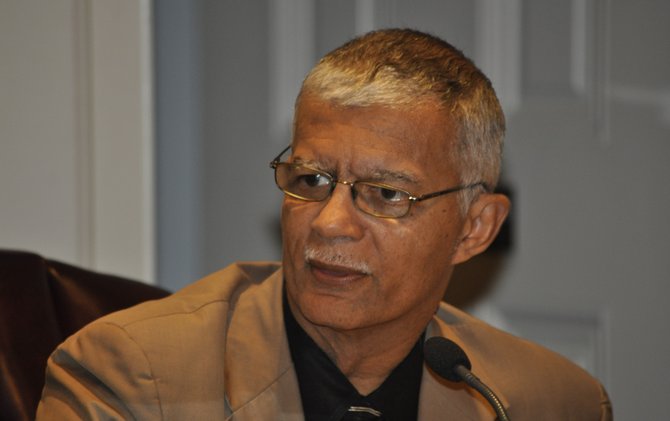Addressing the Mississippi Black Leadership Summit in Jackson Wednesday, Mayor Chokwe Lumumba dismissed the Hinds-Madison-Rankin model of regionalism. Photo by Trip Burns
During this spring and summer, when the Jackson mayoral campaign season hit its peak, a fierce debate took place about regionalism. Broadly, the thinking behind regionalism is that taking a regional, rather than a city-specific, approach to economic development would help all the cities and counties in the region flourish.
Then-candidate Chokwe Lumumba flatly rejected the mostly widely held view of regionalism, which involved grouping the city of Jackson and Hinds County with neighboring Madison and Rankin counties.
"When you have populations like ours, where the so-called minorities are in the majority, and people try to divest that population of the ability to make authoritative decisions, they do that in a number of ways. One is to disenfranchise the voters, and the other is to take all the issues that you really make decisions over, and transfer them to another regional form of government. That, I will not accept," Lumumba said at the time.
Lumumba, who went on to win election as Jackson's mayor, does have his own ideas about regionalism, however. Addressing the Mississippi Black Leadership Summit in Jackson Wednesday, Lumumba dismissed the Hinds-Madison-Rankin model.
"My concept of regionalism goes in the other direction. I would like to do some things in the western part of the state," Lumumba said.
Western Mississippi, as Lumumba explained, is home to 18 contiguous counties, including Hinds County, that span from Wilkinson County in the southwest corner of Mississippi northward to Tunica County and where African Americans make up the majority of the population. By contrast, blacks make up almost 20 percent of Rankin County and 39 percent of people in Madison County.
The leadership summit was not the first time Lumumba talked about teaming up with western Mississippi communities, which Lumumba called "the Kush District" in an April 2013 interview with Against the Current magazine. The Malcolm X Grassroots Movement, which Lumumba founded, developed the Jackson-Kush Plan to promote self-determination, participatory democracy and economic justice.
"We're fighting for the self-determination of that region. This type of self-determination is strategically or tactically tied to enhancing other fights of self-determination in other areas of the South," Lumumba said of west Mississippi in the ATC interview.
For Lumumba, the most crucial part of securing self-determination is making sure Jackson residents participate in the economy and share in the city's wealth.
Recently, Lumumba's administration has signaled a major shift away from the practice of outsourcing public-works projects. Instead, it is moving toward plans to grow the department to complete massive city construction projects—something that plays into Lumumba's philosophy that the city can play a direct role in injecting tax revenues into its own coffers through hiring.
Lumumba said building up city revenues to kickstart projects he promised to deliver during his campaign was a challenge, particularly in Jackson where many people live on fixed incomes. But, he added: "Perhaps the greatest challenge is to put your foot on the pedal and move forward."



Comments